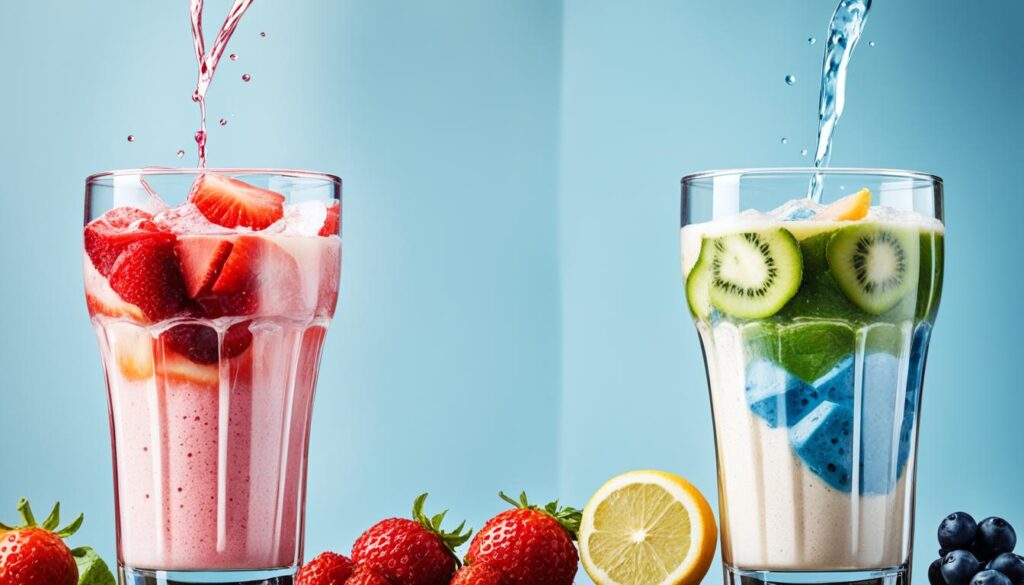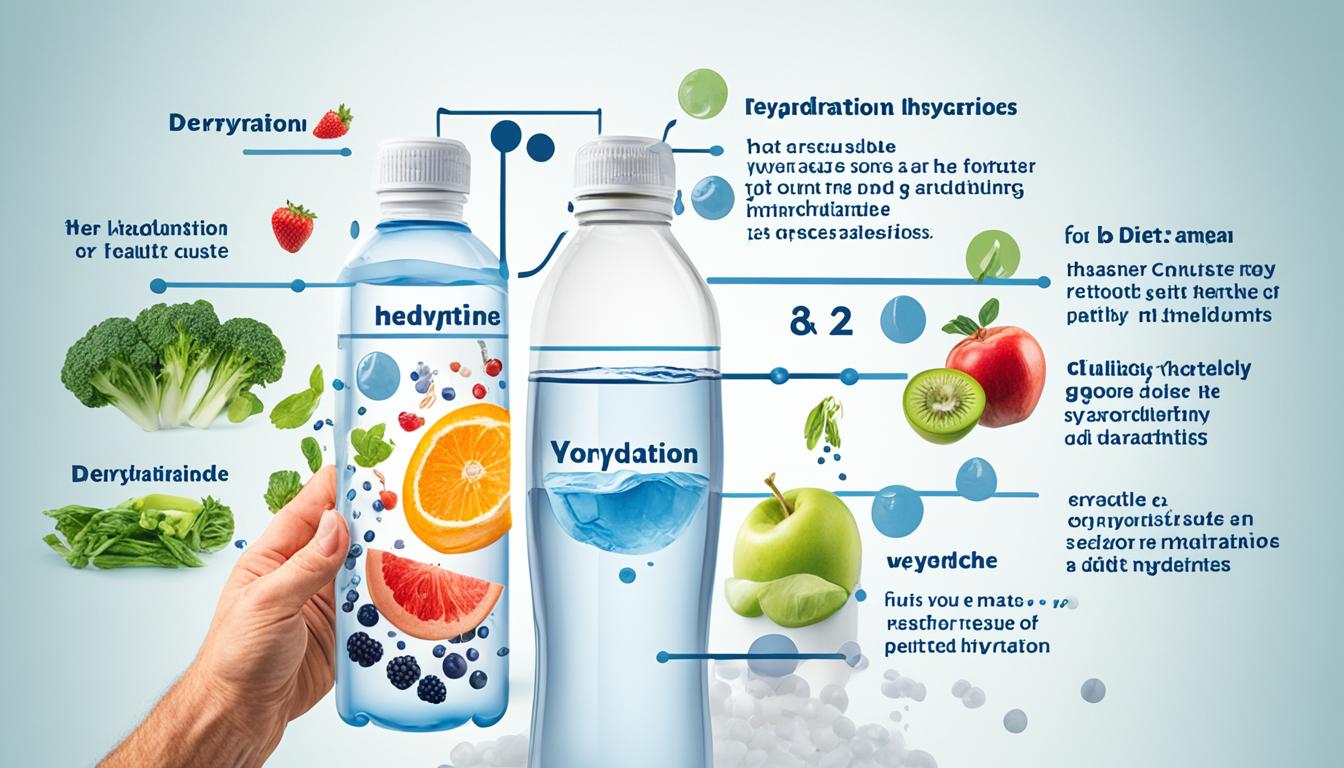Staying hydrated is key to our health. Our bodies are mostly water, around 50-70%. This water is needed for all parts of our body to work well. If we don’t drink enough, we can get dehydrated. Dehydration can cause tiredness, headaches, and serious issues like heat exhaustion and kidney problems.
The U.S. National Academies suggest that men should drink about 15.5 cups (3.7 liters) of water daily. Women should aim for 11.5 cups (2.7 liters). Remember, these are just averages. How much water you need might be different. It depends on your health, how active you are, and the weather. People who are in the sun a lot or exercise vigorously may need to drink even more water.
Older adults often face higher risks of dehydration. A study found that many older people might not be getting enough water. This could be because their bodies change over time, making it harder to keep water in. Some health conditions and medicines can also play a role.
Kids, especially young children, are also at risk. They might not show signs if they’re thirsty. A study looked at how not drinking enough water affected children’s ability to think clearly. It found that staying hydrated is really important for how well kids can think.
Knowing the signs of dehydration is important. Watch out for being thirsty, dry mouth, or dark urine. Feeling tired, dizzy, or confused can also be signs. Tackling these signs early by drinking more water can help avoid the dangers of dehydration.
Understanding the Importance of Hydration
Water is key for our bodies, making up 50-70% of our weight. Staying hydrated is vital for good health. Water helps our bodies in many ways. It keeps our organs working well, helps with digestion, and keeps us cool.
The Role of Water in the Body
Here’s what water does in our bodies:
- Helps control our temperature
- Carries nutrients to our cells
- Gets rid of waste
- Lubricates our joints
- Keeps our blood at the right thickness and pressure
Even a little dehydration can make us feel tired and think slowly. A study from 2000 showed that our brainpower drops without enough water. This shows how important it is to drink plenty of water.
Consequences of Dehydration
Dehydration happens when we lose more water than we take in. It can cause an imbalance in our body. This can make us feel thirsty, tired, and weak. It can also lead to health issues like kidney stones or heat exhaustion.
- Being thirsty
- Feeling tired
- Getting headaches
- Having darker urine
- Dry skin
Long-term dehydration can be very serious. It can harm our kidneys and even our ability to think straight. A study from 1988 found a link between dehydration from heat and thinking problems. So, it’s crucial to drink enough water, especially when it’s hot.
| Population | Recommended Daily Water Intake |
|---|---|
| Men | 13 cups (about 3 liters) |
| Women | 9 cups (just over 2 liters) |
| Pregnant Women | 10 cups (slightly over 2 liters) |
| Breastfeeding Women | 12 cups |
| Kids and Teens | 6-8 cups |
Drinking water is the best way to stay hydrated. But, drinks like herbal teas and milk also help. Fruits and veggies, which are mainly water, keep us hydrated too. Avoid too much sugar and alcohol because they make us lose water.
If you’re active, staying hydrated is very important. For sports and exercise, drinks with electrolytes can be good. For most of us, though, water is always the top choice.
Identifying Signs of Dehydration
Dehydration occurs when the body loses more fluids than it gets. This leads to not having enough water and fluids for normal functions. It can affect anyone, but some are more at risk. These include infants, children, seniors, and those with chronic sicknesses. Knowing the signs of dehydration is important for staying healthy and avoiding problems.

Physical Symptoms
The signs of dehydration differ based on how much fluid the body has lost.
- Feeling thirsty and having a dry mouth
- Feeling tired and weak
- Getting dizzy and having headaches
- Having dark urine or urinating less
- Skin and lips that are dry
- A fast heartbeat and breathing, which are serious signs
For babies and kids, look out for other signs. These include eyes that are sunken, no tears when they cry, and a sunken soft spot on their head. Bad dehydration can cause problems like heat stroke, kidney issues, and seizures. This needs medical help right away.
Cognitive Impairments
Being dehydrated doesn’t just affect your body. It can also mess with how you think. Even a little dehydration can make you:
- Feel confused and out of sorts
- Find it hard to concentrate and focus
- Have trouble remembering things in the short term
- Change mood to be more irritable or anxious
Research shows that losing only 1-2% of your body weight in fluid can mess with how well you think. This is especially true for kids and seniors. So, it’s key to drink enough water to keep your brain sharp and stay well.
| Dehydration Level | Children | Adults |
|---|---|---|
| Mild | 3-5% body weight loss | 1-2% body weight loss |
| Moderate | 6-10% body weight loss | 3-4% body weight loss |
| Severe | Over 10% body weight loss | Over 5% body weight loss |
Knowing how to spot dehydration’s signs can help us take action. This includes keeping a good balance of fluids to avoid serious health problems. Make sure to drink lots of water, eat foods with high water content, and replace lost electrolytes. This is vital for staying healthy and feeling good.
Diet Hydration Dangers
Bad diet hydration can harm the body in many ways. Not drinking enough fluids messes up electrolyte balance. It also causes nutrients not to be absorbed well, and could lead to long-term health issues. Knowing these risks is key to staying healthy.

Electrolyte Imbalances
Sufficient water intake is critical for keeping minerals like sodium, potassium, and magnesium in check. Becoming dehydrated messes with this balance, leading to problems. Signs of this include muscle cramps, feeling tired, and heart rhythm problems. A study in 2005 by Manz and Wentz showed how different countries manage their hydration. It stressed the need to drink enough to avoid serious health issues.
Nutrient Deficiencies
Not drinking enough water can cause nutrient shortages too. Water helps your body absorb vitamins and minerals. Without it, you can’t take in what your body needs. For instance, not enough water means you might not get enough calcium. This could lead to conditions like osteoporosis. Also, vitamins like C and B need water to work. A study on pregnant and nursing women in 1991 showed how important water is for absorbing nutrients and staying healthy.
Chronic Health Risks
Long-term, not enough water increases the risk of big health issues. Kidney stones are a common problem. Without water, minerals can build up in your kidneys, causing pain. Dehydration also makes urinary infections more likely. In worst cases, not drinking enough can lead to kidney failure. This gets worse in older people, as noted by Stookey in 2005. They face a bigger risk of health issues due to lack of water.
| Health Risk | Cause | Prevention |
|---|---|---|
| Kidney Stones | Buildup of minerals due to lack of fluids | Drink adequate water to flush out minerals |
| Urinary Tract Infections | Bacteria growth in urinary tract due to dehydration | Maintain proper hydration to prevent bacterial growth |
| Kidney Failure | Chronic dehydration and impaired kidney function | Ensure consistent fluid intake to support kidney health |
Knowing the dangers of poor diet hydration can push people to do better. Making sure to drink enough water keeps your body’s systems in check. This guards against nutrient problems, long-term health risks, and helps you feel your best.
Staying Hydrated Through Diet
Drinking water is the best way to stay hydrated. But, many foods can help keep you hydrated, too. Fruits and vegetables, in particular, are full of water and vitamins. They also have fiber, which is good for you. Watermelon, cucumbers, tomatoes, lettuce, and spinach are examples of such foods. They contain over 90% water.
Soups and broths are great for getting more fluids, especially when it’s cold. They keep you warm and hydrated. Plus, they’re full of vitamins and minerals. Milk, juice, and herbal teas are also good for hydration. Just watch out for too much sugar and extra calories.
Most people can keep hydrated by drinking water and other fluids when they’re thirsty. But, how much fluid you need can change based on different things. For example:
- Exercise makes you sweat more, so you need to drink more.
- Hot or humid weather can also increase how much you need to drink.
- Health issues like fever or vomiting can affect your hydration needs.
- Being pregnant or breastfeeding can mean you need to drink more water.
The U.S. National Academies of Sciences, Engineering, and Medicine suggest men should drink about 15.5 cups (3.7 liters) daily. Women should aim for 11.5 cups (2.7 liters). Around 20% of this fluid comes from food.
Tips to stay well-hydrated include drinking water with meals. Also, have water between meals, while exercising, and when you’re thirsty. If your urine is light in color, it’s a good sign you’re hydrated enough.
In some cases, like serious dehydration or sickness, you might need special drinks. These drinks, known as oral rehydration solutions, are made to replace lost fluids and electrolytes. But, for most people, eating foods high in water and drinking enough is all it takes to stay hydrated.
Hydration Guidelines for Different Populations
Staying hydrated is key for health and well-being, yet everyone needs different amounts of fluids. Young ones, athletes, and the elderly require special attention for their hydration. This helps them stay in top shape physically and mentally.
Children and Adolescents
Kids and teens must drink enough water as they lose more fluid compared to their size. Drink more water, lower the risk of dehydration. A 2005 study found that kids who don’t drink enough can have trouble thinking. Pediatric hydration is important for them. Schools find that drinking water helps kids think better, too.
Athletes and Active Individuals
People who work out a lot sweat more and need to drink water more often. This also helps their performance. Studies show that in sports like tennis, staying hydrated is a big deal. For the best results, athletes should drink enough, both before and after a game, in any climate. This includes paying attention to the amount of water and the right balance of electrolytes. This way, they can perform their best and keep away from dehydration’s harm.
Older Adults
Older people sometimes don’t feel thirsty, have medications that cause fluid loss, and might find it harder to move around. These things can lead to dehydration. A 2005 study showed that older adults often have signs of being dehydrated. As we age, our body changes how it reacts to thirst and the need for water or salt. Plus, an older person may feel less thirsty because of these changes. To stay healthy, they should drink water often and be mindful of their hydration. Caretakers should also watch out for dehydration signs and make sure older adults drink water regularly.




